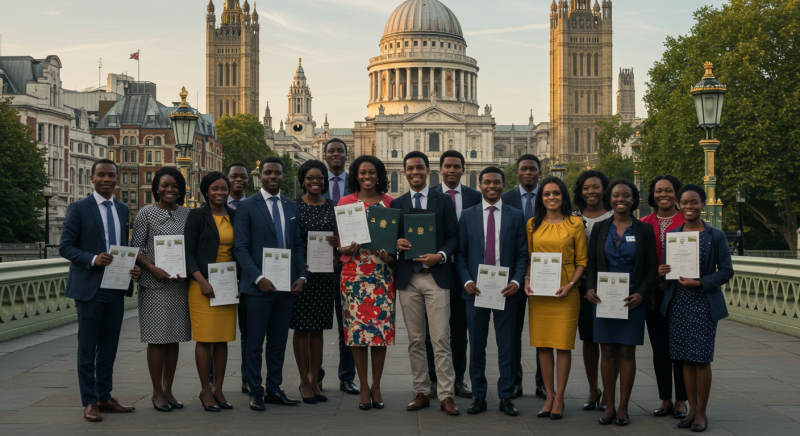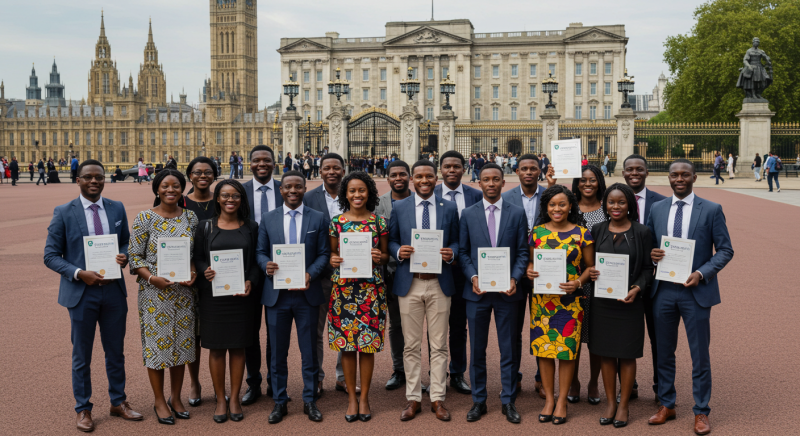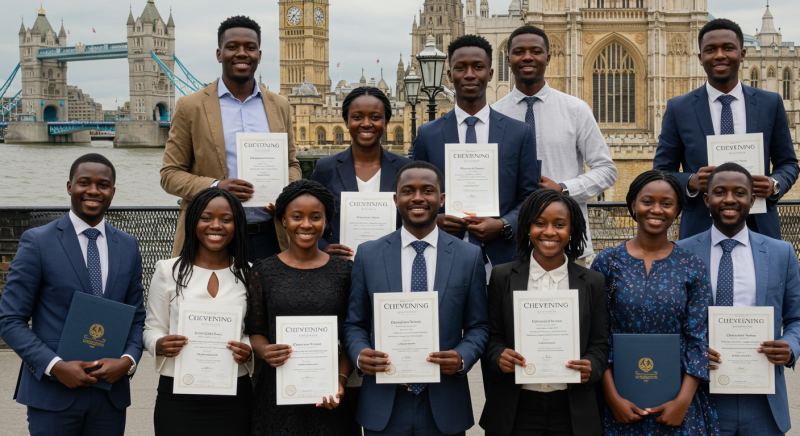Key Takeaways
- The Chevening Scholarship offers fully-funded master’s education in the UK for exceptional African professionals
- Application requires careful preparation of essays, references, and interview skills
- Understanding the core values of leadership, networking, and influence is crucial
- Early preparation significantly increases success chances
- Scholarship includes tuition fees, living expenses, travel costs, and additional allowances
My Chevening Journey
The email arrived at 3:42 AM. I had been refreshing my inbox hourly for days, barely sleeping as I awaited news from the Chevening Secretariat. When I finally saw the subject line “Congratulations on your Chevening Award,” I let out a scream that woke my entire family. After months of preparation, essays, references, and a nerve-wracking interview, I had been selected for the prestigious Chevening Scholarship to study in the United Kingdom.
As a Nigerian professional with big dreams but limited financial resources, the Chevening Scholarship transformed my life trajectory. Now, having gone through the process and mentored other successful applicants, I’m sharing this comprehensive guide to help fellow Africans navigate the 2025 Chevening Scholarship application process with confidence.

What is the Chevening Scholarship?
The Chevening Scholarship is the UK government’s global scholarship program funded by the Foreign, Commonwealth and Development Office (FCDO) and partner organizations. It offers future leaders from across the world the unique opportunity to study for a one-year master’s degree at any UK university.
For African professionals, the Chevening Scholarship represents not just educational advancement but a transformative experience that builds networks, enhances leadership skills, and creates global influence. The scholarship fully covers tuition fees, provides a generous living allowance, return flights to the UK, and additional grants for essential expenses.
Eligibility Requirements for Chevening Scholarship 2025
Before diving into application strategies, ensure you meet these basic eligibility criteria for the Chevening Scholarship:
- Citizenship of a Chevening-eligible country in Africa (nearly all African countries qualify)
- Return to your home country for at least two years after your scholarship period
- Completed undergraduate degree qualifying for postgraduate study in the UK
- At least two years (2,800 hours) of work experience
- Apply to three different eligible UK university courses
- Meet the Chevening English language requirement (if selected for an award)
Application Timeline for Chevening Scholarship 2025
The Chevening Scholarship operates on a strict annual cycle:
- August 2024: Applications open
- November 2024: Application deadline (typically early November)
- January-February 2025: Reading Committee assessments
- February-March 2025: Shortlisting for interviews
- March-April 2025: Interviews at British Embassies/High Commissions
- June 2025: Results announced
- September/October 2025: Studies begin in the UK
Early preparation is critical. Many successful African Chevening Scholarship recipients begin planning their applications 6-12 months before the portal opens.

Crafting Winning Chevening Essays: The Heart of Your Application
The four essays in the Chevening Scholarship application are your opportunity to showcase your leadership potential, networking intentions, influence, and study plan. Each essay has a 500-word limit and must address specific questions.
Leadership and Influence Essay
The leadership essay asks you to demonstrate your leadership skills through concrete examples. As an African applicant, consider:
- Leadership roles in community development initiatives
- Professional leadership that addressed specific challenges
- How you’ve inspired others or led change in your organization
- The impact of your leadership on others
Rather than saying “I am a natural leader,” illustrate it with a specific story:
“When drought threatened food security in my community in Northern Ghana, I mobilized 30 youth volunteers to implement rainwater harvesting systems. By coordinating with local authorities and securing small grants, we installed 15 systems serving 200 families. This initiative later became a model adopted by three neighboring communities.”
Networking Essay
The networking essay explores how you build and maintain professional relationships. Strong responses:
- Describe your existing professional networks in Africa and beyond
- Explain how you’ve utilized networks to achieve goals
- Outline specific plans for engaging with the Chevening community
- Connect networking ambitions to development goals in your African country
Study in the UK Essay
This essay must clearly articulate why your chosen courses match your career trajectory. Successful essays:
- Demonstrate thorough research of specific UK programs
- Explain why the UK educational approach is uniquely suitable
- Connect course content to specific career objectives
- Show how UK education will help address challenges in your African country
Career Plan Essay
The career plan essay requires a clear, realistic progression from your current position to your long-term ambitions. Effective responses:
- Present a coherent career narrative connecting past, present, and future
- Include specific, achievable milestones with a realistic timeline
- Explain how your goals benefit your home country’s development
- Demonstrate how the Chevening experience catalyzes this progression
Essay Writing Tips for African Applicants
- Start drafting early and revise multiple times
- Use concrete examples specific to your African context
- Quantify achievements where possible (numbers, percentages, scale)
- Address the “so what?” question—explain the significance of your experiences
- Have successful Chevening alumni from your country review your essays
- Use simple, clear language rather than complex vocabulary
Securing Strong References for Your Chevening Application
References can significantly strengthen or weaken your Chevening Scholarship application. Select referees who:
- Have supervised you professionally or academically
- Can speak to your leadership, networking, and influence capabilities
- Understand the prestige and requirements of the Chevening Scholarship
- Are willing to complete the reference promptly
Approach potential referees early—at least two months before the application deadline. Provide them with:
- Your CV and draft essays
- Key achievements they might mention
- Information about Chevening values and selection criteria
- Clear deadlines and instructions for submission
African professionals often have rich networks of formal and informal mentorship. While senior government officials or well-known personalities might seem impressive as referees, choose people who truly know your work and can provide specific, detailed examples of your capabilities.
University and Course Selection Strategy
The Chevening Scholarship requires applications to three UK university courses. Strategic selection involves:
- Researching course content, not just university rankings
- Considering program strengths relevant to your African context
- Balancing ambitious choices with realistic options
- Confirming that courses meet Chevening eligibility requirements
- Verifying application deadlines align with the Chevening timeline
Popular UK universities for African Chevening scholars include LSE, UCL, King’s College London, Oxford, Cambridge, Edinburgh, Manchester, Birmingham, and SOAS, but consider universities with specific expertise in your field rather than just prestige.
Interview Preparation: The Final Hurdle
If shortlisted, you’ll face a panel interview at the British Embassy or High Commission in your country. The Chevening Scholarship interview typically covers:
Leadership and Influence Questions
- “Describe a situation where your leadership made a difference.”
- “How have you influenced policy or practice in your field?”
- “What leadership challenges do you anticipate in your future role?”
Networking Questions
- “How have you used your professional networks to achieve goals?”
- “What techniques do you use to build relationships across different sectors?”
- “How will you contribute to the Chevening community?”
Study Plan Questions
- “Why have you chosen these specific programs in the UK?”
- “How does studying in the UK compare to options in Africa or elsewhere?”
- “What specific skills will you gain from your chosen courses?”
Career and Return to Africa Questions
- “How will this specific UK degree advance your career goals?”
- “What concrete contribution will you make to your country upon return?”
- “How will you apply your UK education to address challenges in your country?”
Interview Preparation Strategies
- Research current affairs related to UK-Africa relations
- Practice with mock interviews, ideally with Chevening alumni
- Prepare concise examples that demonstrate Chevening values
- Review your application thoroughly—consistency is crucial
- Visit the UK embassy website to understand bilateral priorities
Financial Planning Beyond the Scholarship
While the Chevening Scholarship is comprehensive, additional financial planning ensures a smooth experience:
- Budget for pre-departure expenses (medical exams, visa fees, initial accommodation deposits)
- Research cost of living in your specific UK city (London is significantly more expensive)
- Understand what is and isn’t covered by the stipend
- Plan for family obligations back home during your absence
- Investigate supplementary funding for conferences or extra activities
The African Chevening Community: Leveraging Your Network
The African Chevening Scholarship community is particularly strong and active. Future scholars should:
- Connect with country-specific Chevening alumni associations before applying
- Research how previous scholars from your country have contributed after their return
- Identify potential mentors within the Chevening community
- Plan how to maintain African professional connections while in the UK
- Consider how to strengthen UK-Africa relations through your scholarship experience
According to the Chevening Annual Report, Africa consistently produces the highest number of applications and has a growing alumni network of over 18,000 professionals across various sectors Source: Chevening Annual Report 2023.
Common Mistakes African Applicants Make
Avoid these pitfalls that frequently derail African applications:
- Generic essays lacking personal narrative and specific African context
- Focusing on hardship rather than achievements and potential
- Unrealistic career goals disconnected from home country needs
- Poor alignment between chosen courses and stated career path
- Late submission of references or university applications
- Insufficient English language preparation for interviews
- Applying with the intention of migrating permanently to the UK

Success Stories: African Chevening Alumni
“The Chevening Scholarship transformed not just my career, but how I view my responsibility to my country. My studies in Sustainable Energy at Imperial College gave me the expertise to develop Nigeria’s first community-owned solar grid project.” – Oluwaseun A., Nigeria, Chevening 2019
“As a Kenyan woman in tech, the Chevening Scholarship gave me credibility and connections I couldn’t have achieved otherwise. The MSc in Artificial Intelligence from Edinburgh opened doors to create an AI training institute that has now trained over 3,000 young Africans.” – Wanjiku M., Kenya, Chevening 2018
These stories exemplify how the Chevening Scholarship empowers Africans to create lasting impact Source: Chevening Impact Report.
Beyond Academics: Making the Most of the UK Experience
The Chevening Scholarship offers more than academic study:
- Chevening-exclusive events and networking opportunities
- Access to UK institutions and policymakers
- Cultural exchange and global perspective building
- Professional development workshops and skills training
- Opportunities to represent your African country at various forums
Post-Scholarship Opportunities for African Alumni
After completing your Chevening Scholarship, numerous doors open:
- Leadership positions in government and international organizations
- Partnerships between UK institutions and African organizations
- Research collaborations addressing African development challenges
- Entrepreneurial ventures with international connections
- Policy advocacy with enhanced credibility
According to research by the African Leadership Institute, Chevening alumni hold key decision-making positions in 45 African countries, with particularly strong representation in governance, education, and sustainable development sectors Source: African Leadership Institute Report.
Conclusion: Your Chevening Journey Begins Now
The Chevening Scholarship represents a life-changing opportunity for African professionals with leadership potential and a commitment to their countries’ development. The application process is demanding but navigable with proper preparation, authenticity, and strategic planning.
Begin your preparation today—research courses, strengthen your professional experience, build your network, and craft your narrative. Remember that the Chevening Scholarship seeks not just academic excellence but potential to drive positive change across Africa.
Whether you’re a public health specialist from Uganda, an environmental engineer from Morocco, or a policy expert from South Africa, the Chevening Scholarship can be your pathway to acquiring transformative skills and connections that benefit your career and your continent.
Frequently Asked Questions
Can I apply for the Chevening Scholarship with a third-class degree?
The Chevening Scholarship doesn’t specify minimum grade requirements, but competition is intense. Applicants with lower academic grades should highlight exceptional professional achievements and leadership experience to strengthen their application.
How many African applicants receive the Chevening Scholarship each year?
Approximately 650-800 scholarships are awarded to African applicants annually, with Nigeria, Kenya, Egypt, South Africa, and Ghana typically receiving the highest allocation. However, numbers vary by country and year Source: Chevening Statistics Portal.
Can I bring my family with me on the Chevening Scholarship?
Yes, scholars may bring dependents, but the Chevening Scholarship provides only minimal additional funding for families. You must demonstrate ability to support dependents financially and arrange appropriate accommodation.
Do I need an unconditional university offer before applying for Chevening?
No, you apply for the Chevening Scholarship and your chosen universities simultaneously. However, you must secure at least one unconditional offer to receive the final scholarship award.
What English language requirements apply to African applicants?
If selected, you must meet minimum requirements: IELTS Academic of 6.5 overall (with no component below 5.5), TOEFL iBT of 79 overall, Pearson PTE Academic of 58 overall, or Cambridge English: Advanced (CAE) 176 overall.
Can I work while studying on a Chevening Scholarship in the UK?
Yes, Chevening scholars can work part-time (up to 20 hours per week during term time) on their student visa, but studies must remain the priority.
Is there an age limit for the Chevening Scholarship?
No official age limit exists, but applicants typically range from 25-35 years. Older applicants should demonstrate how the scholarship fits into their established career trajectory.
What happens if I’m not successful in my Chevening application?
Many successful scholars apply multiple times. Use feedback if provided, strengthen your professional experience, and consider applying for other scholarships like Commonwealth, Mo Ibrahim, or Mandela Washington Fellowship in the meantime.
How can I connect with Chevening Alumni in my African country?
Most African countries have active Chevening Alumni Associations. Contact your local British Embassy/High Commission for connection details or search on professional platforms like LinkedIn for alumni networks.
What expenses are not covered by the Chevening Scholarship?
Pre-departure costs (passport, medical tests, initial visa fees), family expenses, and optional study materials beyond core requirements are typically not covered. Budget approximately £1,000-£2,000 for these expenses.
READ MORE
Attracting Investors to Health and Wellness Business in Nigeria – A 2025 Comprehensive Guide
